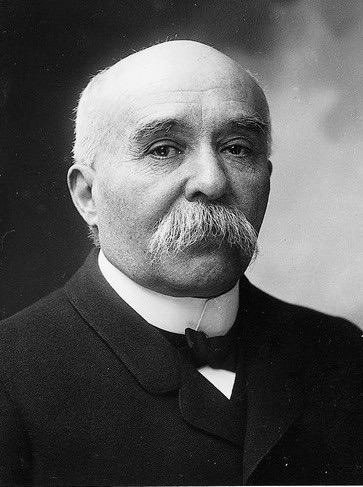People of WWI |
| The Archduke Ferdinand |
| Kaiser Wilhelm II |
| Vladimir Lenin |
| David Lloyd George |
| Georges Clemenceau |
| Eric Ludendorff |
| Sir Douglas Haig |
| Ferdinand Foch |
| Woodrow Wilson |
| John J. Pershing |

Early Life
Georges Clemenceau, born on September 28, 1841, in Mouilleron-en-Pareds, France, was a prominent French statesman and journalist. He grew up in a middle-class family, with his father serving as a physician. Clemenceau showed early intellectual prowess, earning a medical degree from the University of Paris in 1865 and subsequently practicing medicine.
Journalism and Political Career
Clemenceau soon turned his attention to journalism and became known for his sharp wit and critical writing style. He founded several influential newspapers, including "La Justice" and "L'Aurore," where he fearlessly criticized political corruption, injustice, and social inequality. His fearless journalism earned him a reputation as a passionate advocate for social justice.
As a politician, Clemenceau was elected to the French National Assembly in 1876 and represented various constituencies throughout his career. He aligned himself with the Republican Party and became known as a staunch defender of civil liberties and republican values. Clemenceau was a vocal opponent of colonialism and imperialism and advocated for the rights of workers and oppressed groups.
Role in World War I
Clemenceau's most significant political role came during World War I. In 1917, amidst the ongoing war and France's military setbacks, he was appointed Prime Minister of France. Known as "The Tiger" for his fierce determination, Clemenceau became the face of France's war effort and a symbol of resilience and strength.
During his tenure as Prime Minister, Clemenceau implemented a series of measures to bolster France's war effort. He prioritized strengthening military defenses, mobilizing the economy, and boosting morale on the home front. Clemenceau worked closely with other Allied leaders, such as Woodrow Wilson and David Lloyd George, to coordinate military strategies and negotiate peace terms.
Paris Peace Conference and Later Years
After the war, Clemenceau represented France at the Paris Peace Conference in 1919. He advocated for harsh terms against Germany to ensure its disarmament and reparations payments. Clemenceau played a significant role in shaping the Treaty of Versailles, which sought to impose punishment on Germany and redress France's losses during the war.
Despite his achievements, Clemenceau's tenure as Prime Minister ended in 1920 when his government faced political challenges and criticism. He retired from active politics but continued to write and express his opinions on various issues, including pacifism, disarmament, and international relations.
Georges Clemenceau passed away on November 24, 1929, in Paris, at the age of 88. He left a lasting impact on French politics and the global stage. His unwavering determination and commitment to the principles of liberty and justice solidified his place as one of France's most influential statesmen. Clemenceau's role in World War I and his efforts to secure a just peace have cemented his legacy as a key figure in shaping the course of history.